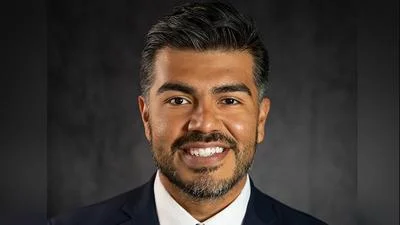Gov. Bruce Rauner
Gov. Bruce Rauner
In Wednesday’s 2018 budget address, Gov. Bruce Rauner said it is possible for Illinois to become the economic powerhouse of the Midwest.
“If the economy rises, everyone rises with it,” Rauner said. “We can make all this happen, but we must abandon Illinois fiscal status quo.”
Enacting structural reforms that allow Illinois to be competitive and compassionate are key, however, he said.

Rep. Allen Skillicorn
Among the top priorities that he mentioned were: putting a stop to unsustainable growth in pension and healthcare costs; and halting and reversing the advance in taxes while also investing more in education, human services, public safety and infrastructure.
Rep. Jeanne Ives (R-Wheaton), who is running against Rauner in the upcoming primary, released a press statement after his address rejecting Rauner’s budget, saying it would make the 32 percent income tax hike permanent and raise property taxes.
“While he promises to immediately roll back the income tax hike on the stump, Gov. Rauner failed to budget to the goal of a rolled-back tax hike,” Ives said. “In fact, the budget Rauner proposed today relies on the money the tax hike takes in.”
Rep. Allen Skillicorn (R-Crystal Lake) also released a press statement after the address renouncing Rauner’s proposal by calling it the largest property tax hike in Illinois history.
“The governor is banking on passing almost $1.3 billion to local municipalities and in turn to our property taxes,” Skillicorn said. “This isn’t just kicking the can down the road. It’s kicking the can to local taxpayers who are already being taxed out of their homes.”
But that is not the way Rauner made it sound in his 40-minute address, which according to him will put Illinois back in the fiscal race.
“Make no mistake, we are in a competition and states around us are winning at our expense,” Rauner said. “They have out legislated and now they are out growing us.”
Calling the numbers “outrageous,” he noted in the last eight years union-run manufacturing jobs went up 110,000 in Indiana compared to a mere 8,000 job increase in Illinois, which is twice the size.
“We can’t let this happen to are hard-working families, and it is time to get back in the race,” Rauner said. “Low growth and expensive bureaucracy are devastating to our working families.”
He said the fiscal year 2019 budget sets out to make structural reforms that will move the state in the right direction by reducing government expenses, but not customer service.
“We will never have balanced budgets if the government grows faster than our economy,” Rauner said.
He also pointed out that the state spent more in pensions and healthcare costs than in K-12 education during fiscal year 2018.
“They now consume more than 25 cents on every dollar the state spends,” Rauner said. “The simple truth is we have to change the way we handle pension costs and manage group health expenses. If we don’t change, our finances will continue to deteriorate and our economy will remain sluggish and tax burden will stay high and keep rising.”
He said the pension reform will create a surplus to pay down the state’s debt by moving pension costs to the “people who do the buying and make them responsible for the paying to.”
However, Ives does not see it that way.
“Gov. Rauner’s version of pension reform is to push pensions on to local districts,” Ives said, adding he fails to give local districts any power in the process. “If local districts are to pick up the cost of employee pensions, then they must also be given the option of whether or not they want to offer pensions or another retirement plan.”
She said without offering an option, the governor is pushing a massive unfunded mandate on to local districts.
“In order to sustain these new costs, schools will either have to cut programs and staff, or raise property taxes – or both,” Ives said.
Skillicorn also called out Rauner’s pension reform, saying House Speaker Michael Madigan (R-Chicago) has been waiting for the opportunity to implement this pension shift for years.
“He has now found the perfect tool to do so in Gov. Bruce Rauner, who has again demonstrated that he isn’t in charge by bending to Speaker Madigan’s will,” Skillicorn said.
Rauner portrayed his plan much differently, saying by shifting pension costs, there will be more accountability since “when people are responsible for paying the bill there will be more incentive to paying the cost,” adding school districts will have to begin sharing pension costs by paying into their own retirement over the next four years.
“We will ask universities to pay their pension costs, also phased in over four years,” Rauner said. “These shifts will save the state $696 million this year.”
Right sizing government health insurance plans and reducing workers' compensation costs are next on the list, according to the governor, who added selling the Thompson Center in Chicago is a must.
“It is time,” Rauner said. "These moves, many of which have been supported by the General Assembly in the last three years, can alleviate a $1.3 billion burden on our taxpayers.”
The fiscal year 2018 budget, which legislators enacted over Rauner's veto last year, proved the point that Illinois cannot spend what it doesn't have, he added.
“This unbalanced budget that we are currently working off of was built on the back of a $4.5 billion income tax increase, $6 billion debt and a still-increasing backlog of unpaid bills that is expected to be at $7.7 billion at the end of this fiscal year.”
By enacting new educational reforms, $8.3 billion will go to K-12 education while simultaneously reducing funding to universities and community colleges. Along with funding for various state programs, Quincy Veterans Home will see $50 million; and child care assistance, elderly, developmentally disabled and mentally ill individuals will also receive more aid. Additionally, $26.4 million will fund life skills training centers to help former prisoners get back to work rather than return to prison.
“For the fourth year in a row, we will deliver more capital for infrastructure projects,” Rauner said.
He said if legislators work with him to address the reforms he discussed, particularly pension costs, together the state can enact a nearly $1 billion tax cut and start rolling back the income tax rate.
“Gov. Rauner outlined a budget that relies on the same income tax hike that he promises to ‘immediately roll back’ on the stump,” Ives said. “And his promised property tax freeze – as inadequate as it is – becomes a massive property tax hike once he pushes pensions back on local districts. Today, Rauner proved again that he has never made a promise he couldn’t break.”






 Alerts Sign-up
Alerts Sign-up